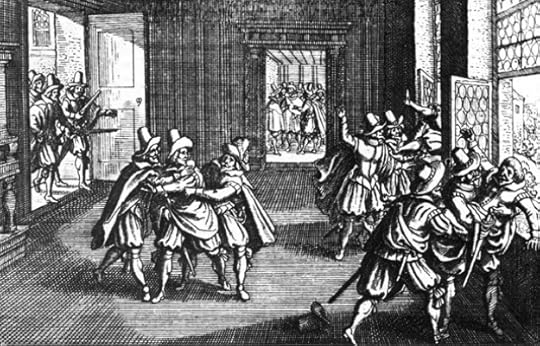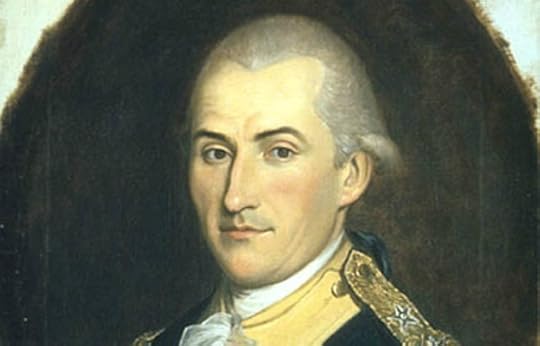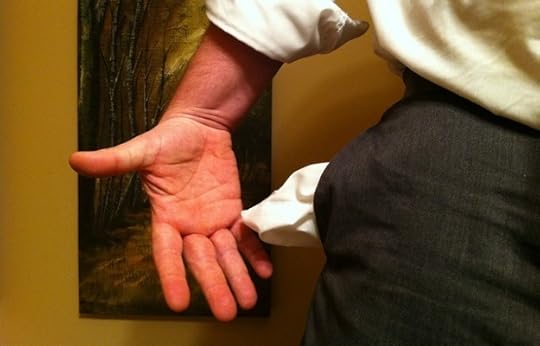Thomas E. Ricks's Blog, page 189
April 12, 2012
No. 6: Another Navy CO defenestrated

This one
was the captain commanding the Navy's Northeastern U.S. health services. The
issue was command climate. That makes 6 for the year, according to the official
scorekeeper.
April 11, 2012
The key but under-acknowledged role of foreign military advisors in U.S. history

On the train from Exeter to London the other day I was
re-reading retired Lt. Gen. Dave Richard Palmer's
Summons
of the Trumpet, partly because I decided I didn't really get it the
first time around when I read it a couple of years ago. I also picked it up
again because it as close as I think anyone has come to writing an operational
history of the Vietnam War.
The book is good, but a bit dated in places. I think General Palmer
is over-optimistic about the implications of the Ia Drang fight. He also seems
credulous about the Gulf of Tonkin incident, especially in his interpretation
that Hanoi was foolish to launch such an attack.
That said, overall I think it is the best book I've been
able to find for an overview of what actually happened in the war, rather than
what people were saying about it.
This is what Palmer writes about the important role foreign
military advisors played in the creation of these United States of America (pp.
27-28). They might be appreciated by anyone trying to advise Afghan forces
nowadays:
"There was once a time when the American army needed foreign
advisors. . . Having neither a nucleus
of professionals nor a backstop of military tradition to draw on, Congress
turned with scant hope to Europe for trained officers. They came. Lafayette,
Steuben, Kosciusko, Dekalb, Pulaski, Duportail -- just to mention a few of the
better known names is to evoke an image of the vitally important role they
played in the winning of our War of Independence.
These advisors tackled an awesome task: molding an army from
raw material in a backward country in the midst of war. A strange and often
inhospitable environment seriously complicated their job, not to mention
problems created by the barriers of language and other cultural differences.
Then, too, buffeted by puzzling and sometimes petty crosscurrents of political
and personal jealousies, . . . the foreigners often suffered acute frustration
and actual bitterness. Nonetheless, they persevered.
. . . Another unchanging reality of advising is the more
or less constant cocoon of frustration enveloping the advisor. Adjusting to
advising is a greater individual challenge than can be easily imagined by
anyone who has not done it.
Britain facing Germany in May 1940: One modern version of the Melian dialogue

By "Jeff"
Best Defense guest historian
I fully appreciate the dialogue between the
Athenian elite and the Melian elite. I am sure that among the Melians
there must have been contention as to what choice to make. In
400 BC, as in our time, an elite in the name of the people always makes such
decisions for better or worse.
A
modern parallel existed in May of 1940 in Great Britain. With her armies
being shattered on the continent and her key ally in the final stages of her
death throes, Britain faced a choice very much like that of Melos.
The
choice was no less stark than that faced by Melos. The enemy was a great power,
with the momentum of victory behind it. It was utterly ruthless. Britain
could have cut a deal with the looming threat -- a deal eagerly sought by Hitler -- and
opted out of harm's way with little loss but of reputation and
humiliation.
Many
of the British elite who were led by Halifax and the Foreign Office were
looking for such a peace treaty but Winston Churchill, understanding the nature of his foe, outmaneuvered the Halifax faction and accepted the
challenge from Hitler come what may. This choice amounted to the key
strategic decision of the 20th century. Churchill's leadership resulted in a
decision that showed a willingness to risk all to preserve western civilization
from Nazi barbarism.
This
choice in my view was anchored in realism. Churchill and his
Parliamentary allies possessed a hardboiled realism that fully appreciated the
consequences of defeat but also the possibilities (as remote as
they seemed at the time) of victory in the end.
Halifax's
approach, in contrast, was seemingly realistic on the surface but in fact was not, because it failed to appreciate the nature of the opponent. Any deal
arranged with the Nazis could only be temporary, because of the innate
predatory nature of the Nazi regime and its cold-blooded ideology.
Churchill, a historian, intuitively understood this important fact.
I
find this parallel with the experience of the Melians very compelling. Had the
Melians had a great power ally (Sparta), perhaps their choice may have become
heroically successful rather than heroically doomed. As it was there was
no deliverer off in the distance whose interests were served by a living Melos.
"Jeff" is an amateur military historian and f
inancial executive retired after
thirty years with Merrill Lynch.
Tom files for e-mail bankruptcy

I'm going to declare what a friend of mine at the Pentagon
calls "e-mail bankruptcy." As I blimblammed around Cornwall, hiking with my family
and having Proper Job ale with fried cod at night, about 2,000 e-mails piled
up. I have tried try to read anything that looked important, but if there is
something you wrote to me that has gone mysteriously unanswered, you might want
to ping me again.
If you are in Cornwall, by the way, try to catch the Motown Pirates, kind of a Cornish version
of the Commitments. The male lead singer does a terrific Marvin Gaye.
April 10, 2012
Berenson's 'The Shadow Patrol': A review

I read most of Alex Berenson's 'The Shadow Patrol' on a
flight from Philadelphia to Manchester, England, across the Atlantic Sea.
It's the first "post-Osama" novel I've read, which gave it
an extra fillip. He occasionally gets military stuff slightly wrong, which was
a slight distraction.
Here are some of the lines I liked:
--"Terror and boredom, the twin poles of infantry duty."
Yes, a familiar thought, but expressed quite succinctly here.
--The CIA view of the world. "We killed Osama. And no
civilian casualties in the op. Not one. Ten years since 9/11 and no real
attacks on American soil. Not even jerks with AKs lighting up a mall. We've
kept our people safe."
--Pakistani duplicity. "Truths might be told in Quetta, but
never on purpose."
--On the American public's lack of interest in our wars.
"You go to a bar, guys buy you a round, ask about what you're doing. But if you
tell them, their eyes glaze over. It's too far away, confusing. Plus they're
ashamed about it because they're getting drunk in college, mommy and daddy
paying the bills, and you're putting your butts on the line for them every day.
They don't want to think about it."
--On today's American generals: "No one ever got stars on
his collar by taking chances."
I'd also be interested in knowing if Joby Warrick thinks of the book. I will ask him.
April 9, 2012
What Tom would like to read in a history of the American war in Afghanistan

I think I've mentioned that I can't find a good operational
history of the Afghan war so far that covers it from 2001 to the present. (I
actually recently sat on the floor of a military library and basically went
through everything in its stacks about Afghanistan that I hadn't yet read.)
Here are some of the
questions I would like to see answered:
--What was American force posture each year of the war? How
and why did it change?
--Likewise, how did strategy change? What was the goal after
al Qaeda was more or less pushed in Pakistan in 2001-02?
--Were some of the top American commanders more effective
than others? Why?
--We did we have 10 of those top commanders in 10 years?
That doesn't make sense to me.
--What was the effect of the war in Iraq on the conduct of
the war in Afghanistan?
--What was the significance of the Pech Valley battles? Were
they key or just an interesting sidelight?
--More broadly, what is the history of the fight in the
east? How has it gone? What the most significant points in the campaign there?
--Likewise, why did we focus on the Helmand Valley so much?
Wouldn't it have been better to focus on Kandahar and then cutting off and
isolating Oruzgan and troublesome parts of the Helmand area?
--When did we stop having troops on the ground in Pakistan?
(I know we had them back in late 2001.) Speaking of that, why didn't we use
them as a blocking force when hundreds of al Qaeda fighters, including Osama
bin Laden, were escaping into Pakistan in December 2001?
--Speaking of Pakistan, did it really turn against the
American presence in Afghanistan in 2005? Why then? Did its rulers conclude
that we were fatally distracted by Iraq, or was it some other reason? How did
the Pakistani switch affect the war? Violence began to spike in late 2005, if I
recall correctly -- how direct was the connection?
--How does the war in the north fit into this?
--Why has Herat, the biggest city in the west, been so
quiet? I am surprised because one would think that tensions between the U.S.
and Iran would be reflected at least somewhat in the state of security in
western Afghanistan? Is it not because Ismail Khan is such a stud, and has
managed to maintain good relations with both the Revolutionary Guard and the
CIA? That's quite a feat.
Anybody got a recommendation on what to read that covers all
this? Maybe articles that explain some of it?
Quote of the day: Colin Powell on the roles of the national security advisor

A few months ago I was re-reading Colin Powell's memoir, My
American Journey, and liked his summary of the job of being national
security advisor: "judge, traffic cop, truant officer, arbitrator, fireman,
chaplain, psychiatrist, and occasional hit man." (P. 352)
I re-read Powell's book and H. Norman Schwarzkopf's memoir, It
Doesn't Take a Hero, back to
back. I was surprised to find I enjoyed both more now than I did the first
time, when they were first published long ago. I suspect this was because back
then I read them as a reporter digging for news, while this time I was looking
more broadly to understand both men and their sense of the Army in which they
served.
Then I read Karen DeYoung's bio
of Powell. "The Bush administration had clearly manipulated Powell's
prestige and reputation, even as it repeatedly undermined him and disregarded his
advice," she writes, and then asks, Why had he let them do it? Part of the
answer, she concludes, was that "he had been winning bureaucratic battles for
so many years that he simply refused to acknowledge the extent of the losses he
had suffered." He also had a sense of duty, she noted. And, she concluded, "He
was a proud man, and he would never have let them see him sweat." (Pp. 510-511,
DeYoung, Soldier.)
April 6, 2012
Tales from the C2 crypt: The American structure for Libya was pretty confusing

The new issue of Prism has a fascinating article
about American command arrangements for the Libya operation earlier this year.
The authors, three souls who toiled in the lower depths of
the Joint Staff's J-7, write that, "the decision was made to retain AFRICOM as
the supported command, with USEUCOM, USCENTCOM, USTRANSCOM and U.S. Strategic
Command (USSTRATCOM) in support."
Sounds simple, but wait: AFRICOM doesn't have any forces, so
EUCOM became "de facto force provider." It is almost as if EUCOM were acting
like a service. (Which would make it our sixth service, after the Army, Navy,
Marines, Air Force, and SOCOM, which already effectively has its own civilian-led
secretariat, in the SO/LIC bureaucracy.)
It gets even more complicated. Many aircraft were flying from bases in
EUCOM's area of responsibility, so EUCOM "retained OPCON of these forces."
What's more, EUCOM had other fish to fry, so reported Adm. Locklear, "We were
responding to OPCON pleas of the provider to make his life easier rather than
the OPCON needs of the commander." It's like a waterfall running in
reverse.
Also, it turned out that AFRICOM lacked the ability to
actually run an operation. (Interesting side fact: Half its staff is civilian,
and it had never rehearsed to run anything.)
Final bonus fact: The U.S. military has apparently come up
with the worst acronym I have heard in a long time: "VOCO." The article's
authors quote an Army brigadier as stating that in the Libyan operation, there
was "Lots of VOCO between all levels of command." It stands for "verbal orders
of the commander." But hold on: Aren't all
orders are verbal, unless the guy is pointing or something? What the
poor general meant was "oral orders of the commander." That would be "OOCO."
I'd prefer "Unwritten orders of the commander," which would be "UOCO," but that
is too hard to pronounce. It could make you poco loco in the coco.
And remember at this point we haven't even gotten into the
command arrangements with the other 14 nations in the anti-Qaddafi coalition
(AQC).
Rebecca's War Dog of the Week: Jeremy and Imi reunited at last
By Rebecca Frankel
Best Defense Chief Canine Correspondent
This week U.S. Marine Lance Corporal Jeremy Vanhoose welcomed
home, officially, his former partner, MWD Imi -- or as she's otherwise described
by Jeremy's mother, "the missing piece to
Jeremy's puzzle of recovery."
While on patrol in Sangin Afghanistan last August, Vanhoose
and his unit encountered not one but three IEDs. Imi alerted to the danger, but
setting off the devices couldn't be helped. In the explosion Vanhoose lost his
left foot and sustained "shrapnel wounds to the right leg, back, and head" and
was medevaced from the scene. As soon as he was able, Vanhoose was quick to let
others know that he didn't blame Imi for what happened saying,
"she was onto something and I just took one more step."
Reported stories about this team are so far scarce, but the
pair is said
to have been a close
one. Vanhoose was a steadfast handler who spent long hours training with
Imi, a German shepherd, before their deployment to ensure they were as ready as
possible. In almost three months of service the team is said to have had
approximately two-dozen finds. It is a dedication and commitment that Vanhoose
has applied to his recovery.
From what I gather from the personal and emotional account
that Ms. Vanhoose gave in January to Silent Rank Sisterhood (a nonprofit
organization devoted to offering resources and support to military families), after
sustaining his injury Jeremy was told that he would be able to adopt Imi. It
turned out to be a promise of support that was more complicated to secure than
the family had anticipated. The question of whether or not Imi might have to redeploy
surfaced after Jeremy returned to the States in September and the adoption became
uncertain. [[BREAK]]
But Vanhoose's mother, Leisa, a self-described "proud Marine
mom" led the charge, what appears to have been a tireless campaign of letter
writing and rallying Internet
support, to get Imi home to Jeremy. Efforts no doubt, which did not go
unnoticed. Today, Mama Vanhoose thanked Jeremy and Imi's Facebook supporters -- she
estimates the page has reached some 247,574 users -- for their well
wishes, concern, and now the shared celebration.
It is indeed a happy reunion for the family with perhaps
even deeper meaning. When Jeremy joined the Marines after graduating from high
school, he was following in the footsteps of his older brother, Joseph, who had
also enlisted in the Marine Corps but was diagnosed with cancer just before he
received deployment orders to Iraq. He succumbed to his illness and passed away
in 2007.
Adopting Imi may have been a long and fraught-filled journey for the Vanhooses,
but now there are two Marines in their household once again.
Side note: As it stands now the MWD adoption process,
especially for those canines still considered viable for active duty, can be
painstakingly slow and arduous. However, I've heard accounts from both sides of
the table; devoted handlers and their families who are keen to bring their
former partners home and from program
managers who deal with the requests and are bound not only by regulations but the
high demand and continuing need for these dogs downrange. I have yet to
encounter anyone involved in this process who isn't trying to do what's best
for the handlers, dogs, and for the
troops on the ground. There is legislation in the works that addresses the
retirement and adoption process of MWDs, something we'll address in an upcoming
post.
Hat Tip: MWD Facebook page.
Quote of the day: Time for the Army to reclaim its professional jurisdiction

1st
Lt. Anthony Formica writes
in the new issue of Military Review
that, "the Army has essentially relayed the messages that it prizes warriors
over soldiers." I think this is correct, and quite damaging to the service.
Formica
continues, "and that if it could rid itself of the burdens associated with
professional soldiering to better pursue the samurai ideal, it would do so,
thereby abandoning professionally critical jurisdictional ground."
The article kind
of rambles around a bit, and then lands on this subject again: "Once
significant combat actions have ceased the Army must begin to regenerate
masters of the profession's abstract knowledge base to reclaim its lost
intellectual jurisdiction."
I suspect he is
probably right. Contractors should not be writing doctrine or teaching officers
how to be officers. Doing those tasks is one of the ways that your next
generation of leaders is created. (Also, as has been pointed out before, having
officers returned from our wars write doctrine means that knowledge from those
wars is injected into current doctrine.)
Thomas E. Ricks's Blog
- Thomas E. Ricks's profile
- 436 followers



